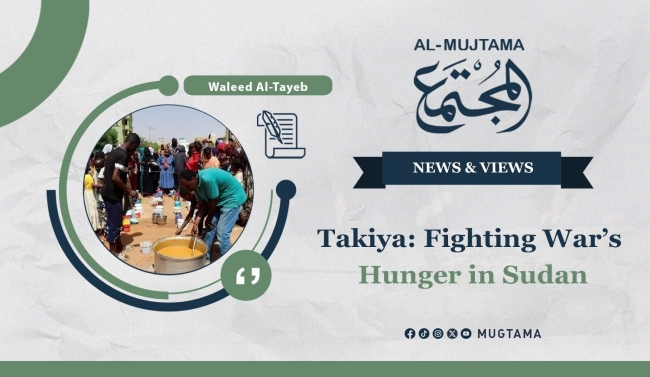With a faint voice marked by the strain of fatigue and physical frailty, Sheikh Awad Abdulrahman spoke to us about the humanitarian situation in war-torn areas of central Sudan nearly a year and a half after the outbreak of war due to the rebellion of the “Rapid Support Forces” against the Sudanese army on April 15, 2023.
Abdulrahman, a professor of English literature and a pious sheikh overseeing a Quranic school in Al Jazirah State, said: “In the early months of the war, the city had food supplies, and the communication network allowed residents to receive financial assistance from family members working in safer areas in Sudan or abroad through banking apps. However, shortly afterward, there were widespread attacks on the communication network and organized looting of markets, driving us into a severe food crisis alongside the constant threat of death.”
Describing the situation further, the sheikh continued: “At that time, people began to establish a new pattern of life based on sharing food. They would bring whatever food they had, whether little or much, to a designated place in each neighborhood where they shared the food and the pains of war. This food was very scarce and, without a doubt, lacked real nutritional value. I lost about 20 kilograms during this period, and this is a common condition.”
In a press conference in Port Sudan at the end of his visit to Sudan on September 8, 2024, WHO Director-General Dr. Tedros Adhanom Ghebreyesus pointed out that 25.6 million people in Sudan, more than half of the population, are facing high levels of acute food insecurity.
Revival of the Takiya
Inspired by their religious heritage, Sudanese people called the communal food place “Takiya.” In the early days of the war, residents in Khartoum and other cities did not need food aid, but the situation at the border crossings with Egypt was different. Tens of thousands of people were crowded at the border gates waiting for permission to enter Egypt, an unprecedented event in the border town of Wadi Halfa. The city could no longer feed the massive crowds of men, women, and children.
In response to this strange situation, a Sudanese girl with roots in the city launched the first initiative to feed those stranded at the border. Sudanese people quickly interacted with her by transferring money to her bank account. This small initiative soon turned into a large phenomenon that provided relief to Sudanese people stranded in war zones stretching from the city of Al Junaynah on the Sudanese-Chadian border in the west to the city of Al-Dinder in the far northeast near the Sudanese-Ethiopian border.
In Omdurman, the largest of the three cities that make up the Sudanese capital, Khartoum, Sufi Sheikh Al-Amin Omar Al-Amin opened his mosque complex (including the mosque and the attached residences for students and followers) to the residents of the Beit Al-Mal and Abu Rouf areas who were besieged in their homes by fierce armed clashes. The mosque complex became a refuge where people from nearby neighborhoods would come daily to receive food and find relative safety, which Sheikh Al-Amin managed to secure through communication with the fighting parties.
Young lawyer Sohanda Abdelwahab represented a face of charity to which people turned for food aid. Her charitable initiative, supported by thousands of Sudanese through small financial donations, extended to a large social project that provided aid to other afflicted cities, along with food.
In early November 2023, prominent Sudanese journalist Osman Al-Jundi launched the “Takiya Fakit Riq” initiative, meaning “Feeding those who woke up with no food.” Al-Jundi explained his initiative to Xinhua News Agency, saying: “The idea of the Takiya was to provide morning tea with milk and local baked goods. It then developed to the stage of offering daily lunch and Friday breakfast for more than 300 war-affected families in the northern neighborhoods of Omdurman.”
Engineer Mohamed Awad Faqir’s initiative, “Supporting the Armed Forces,” aimed at supporting the families of martyrs and frontline soldiers by providing food, clothing, and medical care for those defending their country. This initiative became one of the first and largest of its kind, providing aid exceeding 500 million Sudanese pounds (about two million dollars) in just 14 months.
These initiatives are not limited to the Sudanese capital, Khartoum, alone. The Ansar Al-Sunna Muhammadiya group in the River Nile State launched the “One Body” initiative to aid those affected by floods and rains in addition to the war, with an initial cost exceeding 18 million Sudanese pounds.
Kuwait’s Contribution
Meanwhile, Kuwait's Ambassador to Sudan, Dr. Fahd Al-Dhafiri, announced the arrival of the twelfth plane in the new air bridge to assist those affected by the war, floods, and rains in Sudan.
Ambassador Al-Dhafiri stated that this initiative stems from the noble directives of His Highness the Emir of Kuwait Sheikh Mishal Al-Ahmad Al-Jaber Al-Sabah, may Allah protect him, to stand with our brothers in Sudan and alleviate the disaster of war, floods, and rains.
Ambassador Al-Dhafiri noted that the new air bridge is an extension of the air bridge that began at the start of the war in Sudan, which included 18 planes and two ships of aid, one of which carried life-saving medications for cancer patients worth one million dollars. Kuwaiti charitable associations and institutions working in Sudan have also implemented dozens of humanitarian projects to alleviate the suffering of those affected across different parts of Sudan.
He expressed his appreciation for all the efforts made by official and popular entities in Kuwait, which resulted in the swift completion of this air bridge.
-------------------------------------------------------------


